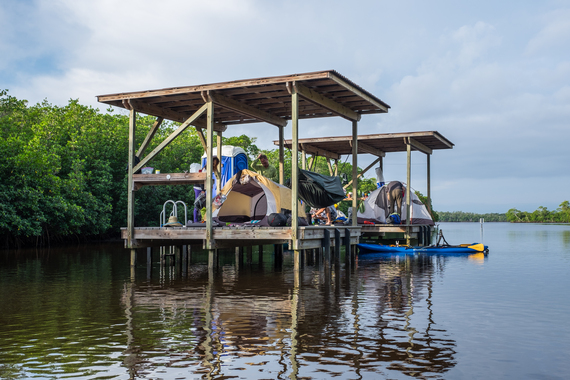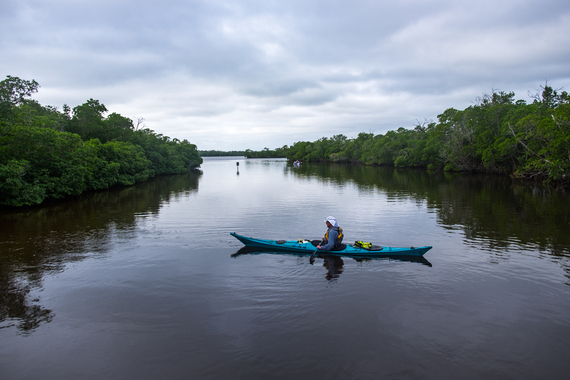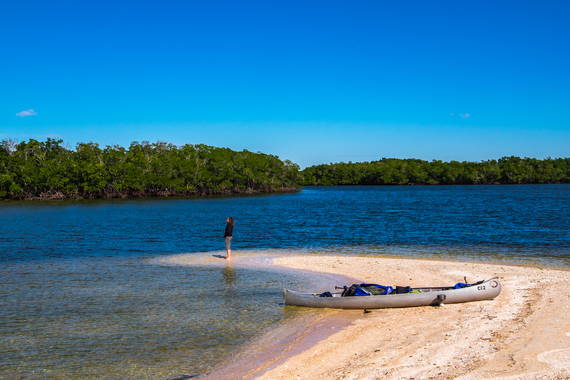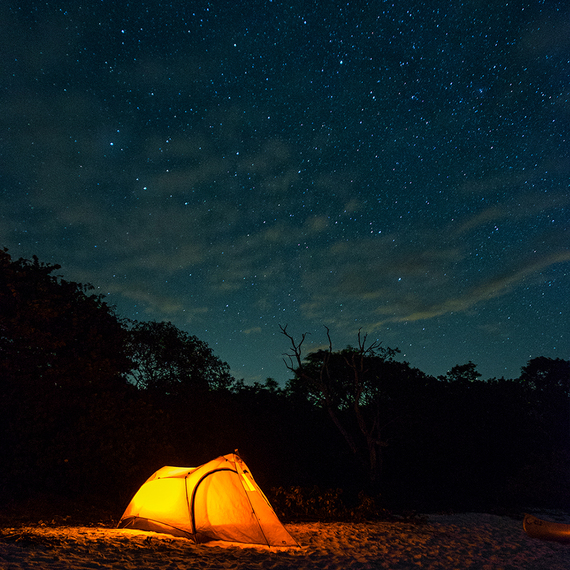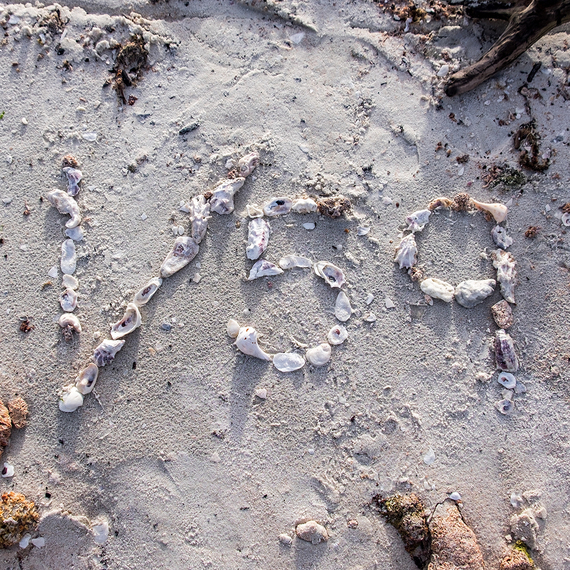Islands covered in mangrove trees, with their wrangling and tyrannical roots, are not made for walking on or pitching a tent if you get lost among them. They are also very difficult to navigate--even with a nautical map, compass, GPS, and coordinates to guide you.
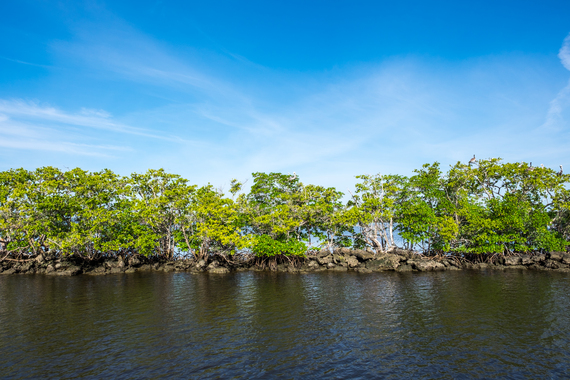
It's easy to get lost paddling through the mangrove trees in the Everglades... | Credit: Jonathan Irish
We decided our GPS didn't work crossing mile 8 on day one of our four-day backcountry camping adventure that we were forging by canoe. Well, I decided it didn't work, Jon believed that the GPS was working just fine but that the coordinates we were tracking probably hadn't been updated since the mangrove trees relocated with the sway of the winds and tides. In retrospect, Jon was right. At the time, though, I was certain that we were destined to become the reason why the U.S. National Park Service Search and Rescue teams would remain on call that evening. From what I understand, those teams are kept very busy saving people just like us--people who find themselves lost among the mangrove trees. These trees are very deceiving. You think you see an opening which disappears when you finally approach it, you hug the coast until you finally find a feasible route, then the GPS tells you to pull a hard right down a waterway that doesn't actually exist. Awesome.
By mile 11, our tired arms--so familiar with stroking computer keyboards rather than thick creek water--were feeling the burn. The sun started to fall and the light was perfect, but our desire to get to our site overpowered our desire to photograph our surroundings. Safety first, always. This was the premiere motto we agreed on when we set out on this adventure. In a fortuitous change of events, the sound of campers voices echoed in the distance from our camp spot at Crooked Creek. We followed that sound rather than the GPS. The sound was right. The GPS was wrong.
Crooked Creek hosts what is called a "chickee" campsite--one of several traditional stopping points plotted within 1.5 million acres of water that weaves throughout the region. It's really just a simple elevated wooden dock covered with a roof structure that likes to leak in the rain. That's right, rain. After hitching up at the days end of our first brutal (but beautiful) day of paddling, it really started coming down. But not before we took some time to get to know our neighbors on the adjoining chickee--two sets of brothers on their annual camping trip, all set up and seemingly better prepared than we were. They had a hammock pod sleeping tent, a hybrid kayak/standup paddleboard that also served as their mobile pantry, and fancy nets to wear over their heads--a middle finger to the state bird of the Everglades: the mosquito. We talked about gear for a while because that's what gear-heads do, and we learned as much as we could about camping in the area before the rain sent everyone to their tents at 7pm.
We made and ate quickly our freeze-dried camping food, zipped up inside our soggy tent, and rocked with the creaking structure as rain pounded the rooftop until we were fast asleep by 7:30.
At 8pm, a large swimming beast slammed our canoe into the dock startling everyone--neighbors included--awake. "Everyone okay over there!?" They drawled. "Fine, thanks!" We were asleep again in no time. At midnight, a half moon shone into our tent like a megawatt flashlight. At 2am, the stars twinkled brightly through the mesh window that one of us had opened in our sleep after the rain had stopped. Then at 3am, 4am, 5am and until we finally rose at 6:45am, a circus of splashing danced beneath the chickee. I thought it was an alligator. Jon thought it was a large fish feasting. The neighbors confirmed it in the morning, Jon was right again!
The next day, we paddled 11-miles into the ocean to Jewel Key where we would camp the next night. The waterway between Crooked Creek and Jewel Key is true estuary formed where Everglades fresh water and Gulf of Mexico saltwater converges. We saw dolphins surfacing, manta rays springing into the sky, sand banks and skies filled with diving birds, fish jumping toward and away from them, and other paddlers looking for campsites inside of the national park. It was completely different experience than the day before.
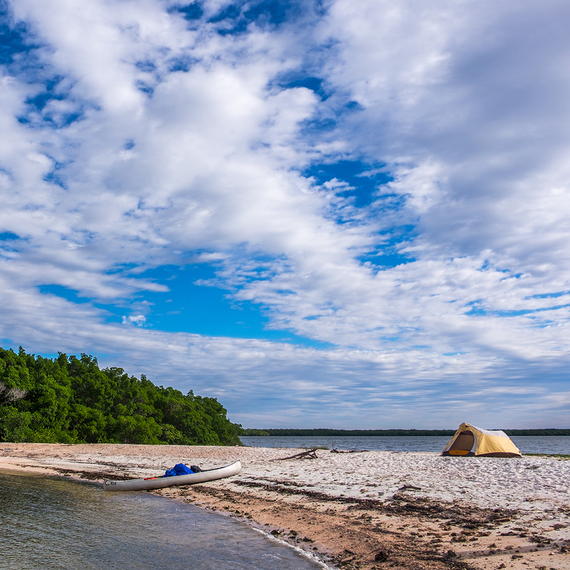
Jewel Key is an awesome place to go beach camping in Everglades National Park | Credit: Stefanie Payne
As soon as we hit land and set up our tent, the rain flooded in again. It rained night after night during our voyage through backcountry. It's either dumb luck or great luck depending how you look at it--dumb to try to cook food and manage gear in the rain; great that we had the chance at all to set up on dry shores.
Eventually the rain subsided and we met our camping neighbors and worked together to start a fire. I believe that until a campfire is lit, one is not actually camping. They had a hatchet (which we accidentally left behind in our car), and we had fire starter (which they'd used up the day before). It was another fortuitous occurrence. We chatted by until the rain came, skipped dinner out of laziness and fatigue, and again, all were zipped up and fast asleep by the time most back at home in DC are sitting down to watch Sunday night programs on HBO.
When we paddled out the next day, we crossed colony of true snowbirds--white Pelicans--gathered on the edge of an Island called Indian Key where they would stay to fatten up all winter. We stopped on isolated peninsula where we picnicked in the sun before starting the monstrous paddle across open water to our last beachfront campsite at Picnic Key. We caught the sunset, built a fire, indulgently ate freeze-dried astronaut food and relaxed until stars filled the night sky. We illuminated our tent with a small lantern and Jon taught me how to shoot astrophotography. I obsessed over Orion's belt--the constellation that NASA's spacecraft, Orion, was named after. Then, the International Space Station flew overhead. I didn't photograph it (sorry space friends!), and instead, reflected my own journey beneath it.
We chose the Everglades as our first park based on seasonality.
We chose backcountry camping because it would bring us to remote places that we otherwise would not be able to access, and also because we wanted to push our bodies from the very beginning of this journey.
We chose a canoe as our mode of transport because it is how these waterways have been traveled by American Indians and Floridians for centuries (a benefit to modern travelers is that they can pack more gear than kayaks and other self-propelled watercraft can.)
We chose the U.S. National Parks because we wanted to celebrate the park system that has brought to each of us so much pleasure and inspiration in our lifetimes during their celebratory centennial year.
Before we entered our first park, neither of us knew much of what to expect. What we found was land and water as far as the eyes could see--swamps, beaches, coasts--and we barely scratched the surface. I've read mutterings on social media that the idea to visit all of the parks in one year would deprive us the opportunity of truly getting to know any park. While that may be true, our goal is to have one great adventure in each of them, which we did in spades in the Everglades.
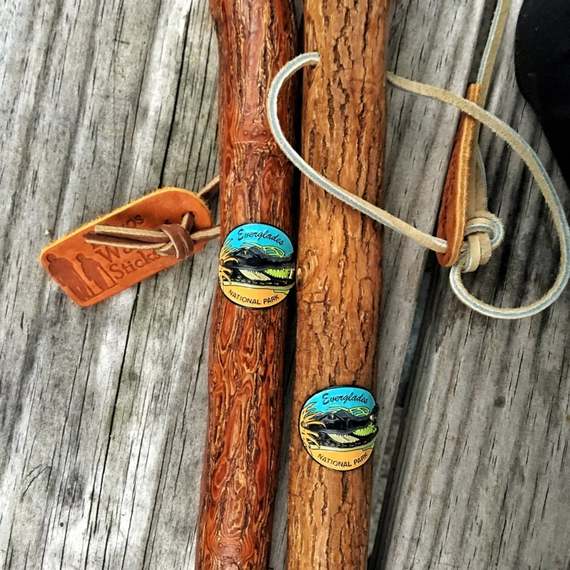
Every park has a hiking stick medallion and we intend to gather them all. Aside from the memories we create this year, it will be our most treasured keepsake! | Credit: Stefanie Payne
#59in52
Website: www.thegreatestroadtrip.com
Facebook: www.facebook.com/59in52
